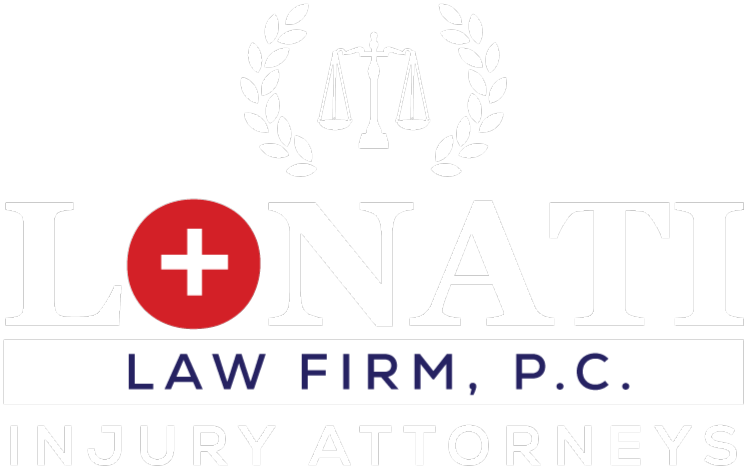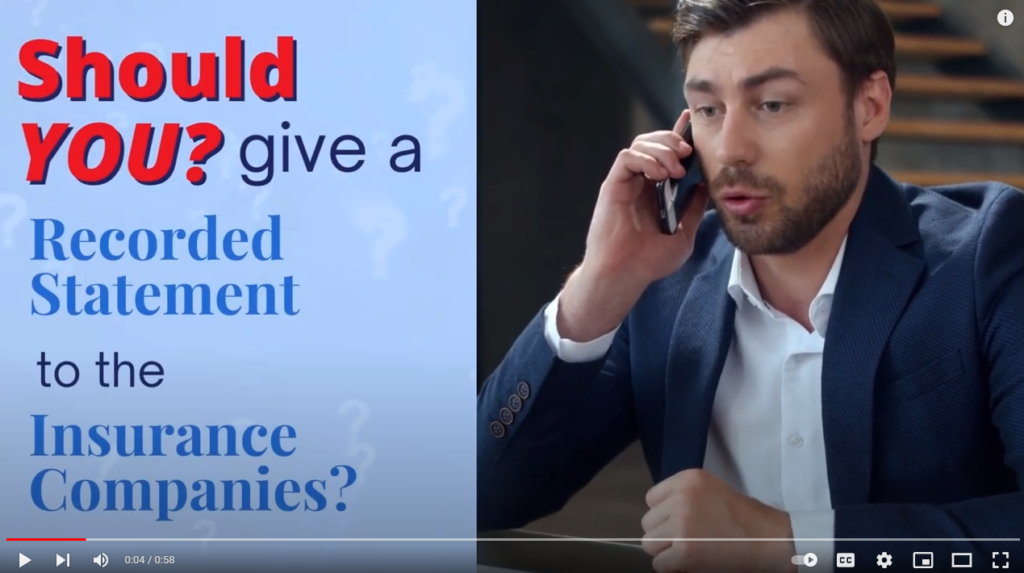No. You are not legally obligated to speak with anyone other than a police officer if you are injured or witness an accident, and doing so could hurt your accident case. It doesn't matter whether they are from a lawyer's office, insurance company, or elsewhere.
If you've been injured, you need to know exactly how to handle the insurance company. Read on to find out what the attorneys at Lonati Law Firm recommend.
Will the Insurance Company Contact Me After an Accident?
If you are hurt in an accident that was not your fault, you'll probably be contacted by an insurance company right away. Most people don't know how to deal with insurance adjusters, and assume the friendly voice on the other side of the phone will help them. Unfortunately, that's just not reality.
The insurance company wants to settle your case quickly and for as little money as possible.
They discourage hiring an attorney by creating urgency for you to act quickly. Instead, they want you to accept a lower settlement amount and close the case immediately. This is why more than half of all people in an accident do not contact an attorney and do not get the compensation they need.
The case is over forever when you take the money and sign a release.
Every week, we hear sad stories. There are so many people who are tempted to take a few thousand dollars from the insurance company immediately. But that money is usually not enough to cover all of the damages from the accident. Plus, it could take weeks for specific injuries to become apparent. By signing a release, you will lose all of your rights to more compensation.
Signing documents without knowing what they mean can be confusing for someone who is not an attorney. For example, you may mistakenly believe that you are signing a release of property damage when you are signing a release of liability.
Insurance companies have also been known to lie to injured victims. For example, they might tell you that the paperwork you're signing confirms that they will pay your medical bills, when in reality, they are NOT going to pay the medical bills. Once you realize this, it will be too late, and you'll be stuck paying the bills. That's why it is always best to have an experienced attorney look over the documents before signing anything.
What Tricks Should I Expect from the Insurance Adjuster?
Insurance companies hire claims adjusters to evaluate accident and injury claims. Immediately after the accident, the insurance adjuster will contact you to collect your personal information and inquire about your injuries and what happened during the incident.
When answering questions, you need to be careful, as some of your answers could be used against you in the future. For example, when the adjuster asks, "Good afternoon, how are you?" And out of habit, you say, "I'm fine, thank you." They can use this "admission against interest" to lower your compensation, because injured people aren't "fine."
Some of the other tricks we've seen adjusters use include:
- Inconsistent story: Your statements will be compared to what you told law enforcement at the scene and what witnesses said. When you tell the insurance company something different from what you said at the scene of the wreck, they will pursue any inconsistencies.
- Downplaying your injuries: Insurance adjusters might ask where you feel pain or where the injury is on your body. Your answers may be used against you later (e.g., forgetting about an injury, saying you felt fine after the accident, and so on).
- Too much information: Although claims adjusters may sound friendly, their main goal is to settle your claim for the least amount possible. The insurance company will attempt to devalue and discredit your claim by getting you to divulge information about past injuries.
- Tricky questions: You may be asked questions during recorded statements to trick you into giving answers that will harm your claim. It's not uncommon for insurance adjusters to use confusing language and misleading questions to get accident victims to say things they don't really mean. Many everyday phrases like "I'm fine," "I'm not sure," "I guess so," or "I didn't mean to" are interpreted by insurance companies to mean anything they want.
- Twisting your answers: Insurance company employees might rephrase your words to alter the meaning of answers, suggest that you have limited memory, or create uncertainty about how the accident happened.
- Lack of Knowledge: Within a couple of days of a wreck, you're unlikely to be able to give a fair assessment of your injuries. If you tell the insurance company that your injuries aren't that bad, and then find out you have internal bleeding the next day, they will definitely use your first statement against you. This can result in losing the compensation you need for medical expenses. Be on the lookout for any signs that your condition is worsening in the days and weeks following your accident. You should pay attention to your health and let an attorney handle the insurance company to ensure that you heal properly after the crash.
- May be used during your trial: If your case should go to trial, your recorded statement may be used as part of the cross-examination to discredit you.
Speaking with a lawyer before providing any recorded statement is crucial to protect yourself from these tricks. It is absolutely fine to tell an insurance adjuster that you would like to speak with your attorney before making a recorded statement, even if they try to convince you not to.
How Can a Statement Be Used to Reduce Your Injury Claim?
It's best to hire an experienced personal injury attorney to handle any requests from the other driver's insurance company. Any innocent statement you make could be used against you, regardless of whether you were at fault.
The reason for this is that insurance companies want to make sure payouts are kept to a minimum. Here are some of the ways they may use a recorded statement to lower your claim:
- They may argue that your statements are inconsistent and do not match.
- The adjuster can claim that third-party witnesses or other parties directly contradict your statement.
- If your statement is missing specific details, the adjuster may make assumptions to fill in the gaps.
- They may argue that your foggy memory or medical condition makes your account irrelevant or incorrect.
- If you are unaware of the matter or have limited experience, the adjuster may suggest your opinion is of no value.
Never try to handle the insurance company on your own. Instead, contact an experienced injury lawyer in Dallas, GA, at Lonati Law Firm. This will ensure that your claim is covered to the full extent of the law.
Common Questions During Recorded Statements and How to Respond
During trial and claim negotiations, the insurance company uses a recorded statement to obtain the victim's account of what happened during the accident. Insurance claim adjusters will attempt to obtain these statements immediately after an accident to produce answers that benefit the insurance company.
Insurance companies do this so they can get your statement before you talk to lawyers and before you are aware of how bad your injuries actually are. For example, the first few days after a collision might feel like you're just bruised and sore, but over time you may begin to experience more severe symptoms.
"Never talk to the insurance company before you talk to a lawyer," says Attorney Michael Lonati, "Our attorneys are experienced in negotiating with insurance adjusters on behalf of our clients to protect their rights."
The most common questions asked during recorded statements include:
Generally, a claims adjuster will begin the recorded statement by introducing themselves and stating the date. Then they will ask for your name, phone number, and address.
As a way of establishing your agreement, they may ask you:
- Do you consent to this statement being recorded?
- Are you aware that this statement is recorded?
- Can I record this conversation with your permission?
After an auto accident, you might be asked:
- What make, model, and year is your car?
- Do you own the car?
- Did any property damage occur?
- Is there any other vehicle involved?
- Were there any passengers with you?
- Were you driving for business?
Other general questions may include:
- What was the date of the accident?
- Describe the accident. How did it happen?
- Are there witnesses or video footage?
- Did you try to prevent the accident from happening?
There will also be personal questions, such as:
- What kind of injuries do you have?
- Was an ambulance called?
- Did you receive medical treatment at the scene of the accident?
- Did you see a doctor after the accident?
- Have you used any drugs or alcohol within the last 24 hours before the accident?
- What is your occupation?
- What is the nature of your work?
- What is your income?
- Is there any chronic condition or previous injury that you suffer from?
At the end of the conversation, the adjuster often asks if there is anything else you wish to add and if everything you said is true.
Here are some tips if you decide to speak with the insurance company:
- Never admit fault or apologize. Fault is a legal definition based on the facts of what happened; stick to the facts if the adjuster asks you that question.
- Do not deviate from the questions asked.
- For any unclear questions, ask for clarification.
- Say what you mean with confidence and certainty.
- Make sure you listen carefully and respond concisely.
- Do not guess or assume anything when you are unsure about a fact. If you don't know, just say so.
- Always remember that the insurance company wants to reduce the compensation you receive.
Do I Have to Give a Statement to My Own Insurance Company?
Your own insurance company may ask you for a statement after the accident. Some policies require drivers to provide this recorded statement after an accident. However, you can still speak with your lawyer to protect your rights before giving a statement.
Don't assume that an insurance provider is looking out for your best interests just because you pay them a premium. Your insurance company may reduce your compensation or raise your insurance rates if it decides you are at fault.
How a Dallas, Georgia Injury Lawyer Can Help You
Insurers are not on your side, but a good lawyer is. Choosing a good lawyer means you'll have someone fighting for your rights.
Dealing with an insurance company can be nerve-wracking, especially when your emotional, physical, and financial well-being is at stake. But having an experienced lawyer you can depend on makes a big difference in how the case turns out.
What Can I Do to Protect My Case After an Accident?
You can safeguard your right to seek fair compensation for your losses after a personal injury accident in Georgia by:
- Seek medical attention right away, so you can determine the extent of your injuries, receive the care you need, and create a formal record.
- Take your recovery seriously by following your doctor's treatment recommendations to protect your health.
- Collect evidence from the accident scene, such as pictures, witness statements, and your written account of the accident.
- Maintain a record of all repair invoices, medical bills, lost wages, and other financial losses related to your accident and injuries.
- Contact a skilled personal injury lawyer in Dallas, Georgia, at Lonati Law Firm as soon as possible.
Call a Dallas, Georgia, Injury Attorney You Can Trust
Attorney Michael Lonati says, "After representing hundreds of injured victims in Georgia, I know that the healing process consumes nearly every aspect of your life. So don't spend the little time and energy you have dealing with tricky insurance calls. Let us handle the insurance companies, so you can focus on getting better."
Get in touch with Lonati Law Firm if you have been injured unfairly. When you hire us to represent you, our team will do everything possible to ensure you receive the compensation you deserve and are entitled to under the law.
Just call 678-363-3500, or fill out the quick form on our website to schedule your free consultation.






